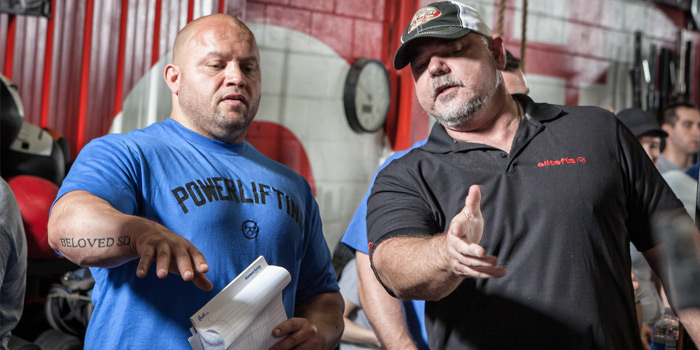
Last year, the NCAA mandated that all strength coaches must be certified. I remember reading posts on social media from coaches saying that this was a game changer and that now we would get the respect we deserve. While I liked seeing this rule pass, I didn't think that it would truly do much for us a profession. In order to move forward, I think we must first start by understanding our problems as a profession.
We still have too much fighting as a profession.
How often do two strength coaches disagree? And they can't possibly just disagree. One must clearly be incompetent at his/her job. Think about how this comes off to coaches. Let's say that Coach Joey Smith coaches at school A and his strength coach knows for a fact that kettlebells are the greatest invention ever. His athletes do Turkish get-ups and kettlebell swings for days. Coach Joey Smith gets a new job and the strength coach at his new school, school B, has never used kettlebells. Strength coach B could be well informed and may make the athletes better, but he just has a different method of doing so. So Coach Joey Smith calls his old strength coach and says, "We don’t have kettlebells at school B." How would this go from here?
From my experience, it could mean that Coach Joey Smith starts out with little confidence in his new strength coach or the new strength coach must now call the old strength coach and learn what he/she doesn’t know. Either way, it makes the strength coach look ignorant.
One way that I think we can solve this is when your old coach calls and says school B doesn’t use kettlebells, you could explain that that is the philosophy at school A and that there are many different ways of doing things. This gives the new strength coach a chance. In other words, don’t judge without all the information.
We don't have a strong, unified organization.
But we do have two strong organizations. I remember Pat Ivey asking me why we can’t have two organizations that respect each other and work together. He is 100 percent correct, and we saw some of that this year when the NSCA and CSCCa drafted a letter together to the NCAA about the certification issue. The hardest part about this for me as a practitioner is that I can't afford to attend two national clinics each year, so I tend to go to the CSCCa. This isn't because I don't like the NSCA, but the NSCA conference is in January, which is a much harder time of the year to travel. Support both groups, join both groups and work within both groups to aid in our growth.
Hiding information is still a huge issue.
I've seen this much more in the private sector than in our setting, but it still occurs. Here's something to remember—everything that you've done has been done before. For example, one of my training partners and good friends (the Casey Williams) posted a video of himself doing barbell suitcase holds for time. He did 135 pounds for a minute or so. Within a few minutes of the video being posted, he had comments from all around the world. My favorite was from Ed Coan who said (and I'll paraphrase): Yeah, I used to do these, but I used weight.
RELATED: Are You Consuming, Producing or Engaging?
Casey thought that he was on to something unique (maybe not new but underused). Boy was he ever wrong! Ed Coan held 465 pounds for time back in the 90s. My best is 135 pounds for 10 seconds per hand. The moral to this story is that we don't have any secrets, and hiding your information and not sharing because “you don’t want to help someone beat you” is crazy. Trust me—everything that you share will come back to you tenfold.
We don't always act in a professional manner.
Here’s a huge moment of honesty that could one day get me fired. Some days I get really frustrated with my athletes and I yell, swear or slam weights. Yes, it happens. I try not to, and I don't do it as much as I once did, but it still happens.
Throughout my career, I've had many athletes not get what I was trying to say and not love me or the weight room. I find this hard to believe because I'm very lovable (just ask Casey Williams), but in reality, not everyone will like you. I love social media because I get to see how much everyone loves each other, but in the real world, some people won’t like you. This should never be an excuse to act in an embarrassing manner.
A gentleman I used to work with (who I respect very much) was fired from a “big time” university after ESPN showed him at practice acting in a way that they considered unprofessional. ESPN didn't show the athlete and the coach embracing after a win. They only showed the negative side. I'm not defending this coach or ESPN, but we all need to consider that if I took the worst 15 seconds you've had in your career, would you still be employed?
We sometimes treat our young staff and interns poorly.
“The characteristic of a well-bred man is to converse with his inferiors without insolence and with his superiors with respect and with ease” (The Earl of Chesterfield).
RELATED: Lessons from the 2015 CSCCa Conference
Never forget that the young intern who works for you today could be your boss one day. Strength and conditioning is dominated by young people. It's amazing when I get a resume from an intern candidate and find out five years later that he's a head strength coach somewhere. Your interns and volunteers are the ones who make your world go round. Strength coaches love to talk about getting respect from coaches, athletes, the administration and more. Why not start by giving respect to those below us?
I started out this article talking about certifications, and I want to make sure that we don't forget about this topic. While I just discussed five ways in which we can raise the level of our profession, we still do need certifications to empower us in our quest for excellence. In my honest opinion, the NCAA did more damage to us as a profession when they back-doored their own policy at the eleventh hour. For those of you who don't know what I'm talking about, the NCAA basically stated that the school can decide what counts as a certification for strength coaches. Prior to this, only the NSCA, CSCS or the CSCCa SCCC counted as national certifications and we all needed one of those. But now, a school can say that they feel a personal training certification is good enough for a strength and conditioning coach. I don't blame the NCAA. I blame us.
In order for us to change the perceptions of what we do as well as improve our lots, we must improve our professionalism. This means get certified, attend clinics, continue your education, serve your students as well as your university and grow as a person and as a professional every day. Today is day one. I challenge all of us to begin now and start raising our level of expectations.
In 1952, Albert Einstein released a book titled The Principle of Relativity. In this book, Einstein concluded that time is nonlinear. This may seem like an odd way to end this article, but stay with me. What this means to me is that each moment is independent of all other moments. We must make a choice each and every moment about how to live. We could choose to be lazy or professional, work hard or sleep. But each and every moment is independent of the others. So don't sit on your past accomplishments. Don't worry about the future. Put your mind into this moment and do what it takes to make us/you better.












Thanks for the kind words I think the quote is Matthew 6:34 "Therefore do not worry about tomorrow, for tomorrow will worry about itself. Each day has enough trouble of its own."
I am sure it has been said in many ways but I like this one. We do need to stand together as an industry in order to improve